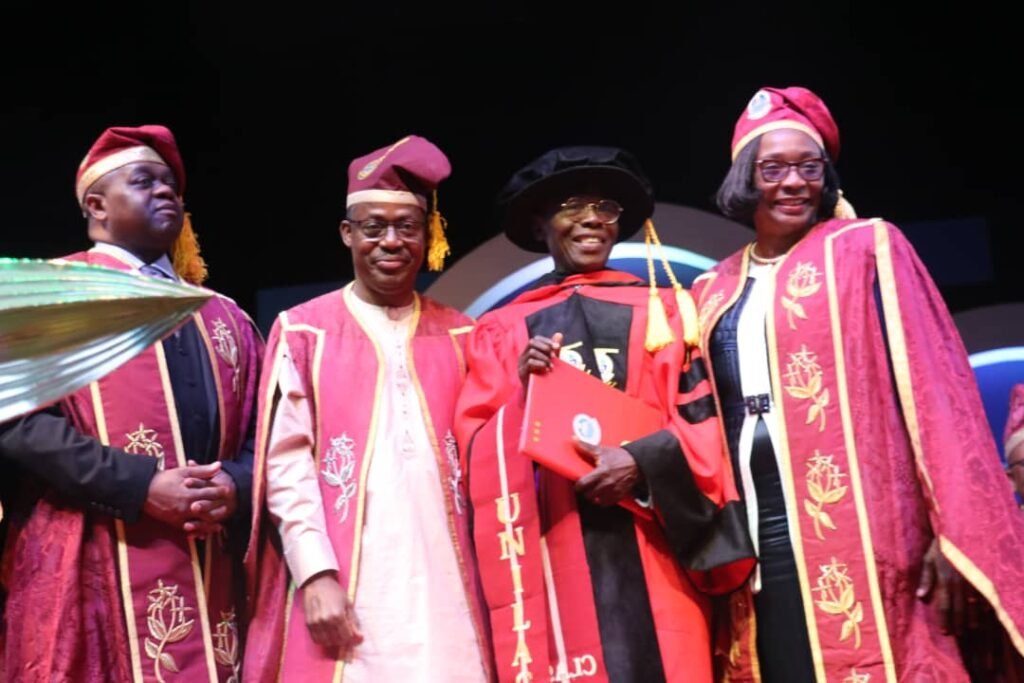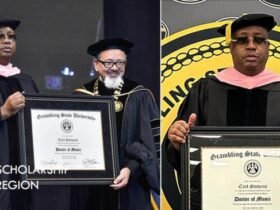Akoka, Dayo Duyile, an 82-year-old journalist has officially bagged his PhD Degree from the University of Lagos.
Read his inspiring story, from his challenges to experiences and opinions on certain aspects of his life. Mr Duyile, who was one of the reporters who witnessed and reported the official inauguration of the university in 1963, was the center of attention at the institution on Wednesday when members of the university’s management, guests, well-wishers, and students hailed him for the feat.
The graduand, who described the achievement as a 40-year-old dream, said the ultimate goal is to become a professor of journalism. The accomplished journalist said he had many opportunities to pursue his PhD programme as early as 1990 but that his employer at the time could not release him to go for it.
He said: “My intention to have a PhD degree is about 40 years old now. I have been making efforts since I was just between 35 and 45. I had tried to put in for it but unfortunately, one thing or the other would disturb me.
“I recall that Michigan State University admitted me for Phd in 1990 and gave me a teaching assistantship along with a scholarship but because I was the Director of Nigeria Institute of Journalism, the Chairman of the board, Alhaji Lateef Jakande, did not permit me to leave the institute for the offer. Then I got another admission to a Canadian University but I couldn’t go due to another engagement.
Read Also: Meet Philip Emeagwali, the high school dropout who invented the world’s first Supercomputer
“I also got another opportunity at the University of London and I couldn’t go. In fact, I got six opportunities for my PhD during my active career years. So when I retired and I returned home to Ondo State I found that I should have the opportunity to now go back to the university for my PhD because it has been a life ambition to have a PhD.”
He also said with the support of his family, his lecturers, and the people around him, he was able to complete the programme without much trouble.
According to Mr Duyile, the major challenge he experienced throughout the time of his study was transporting himself from Ondo town, a three-hour journey, to Lagos, twice a week.
The graduand, who was also combining the programme with his teaching job at universities, said he would hit the road as early as 4:30 a.m. sometimes, to beat traffic gridlock on the popular Lagos-Ibadan expressway.
He said:
“My wife has been very supportive. I travel from Ondo to Lagos two times a week for lectures and I would be the first student to be in the classroom. At times, there would be traffic gridlock. Sometimes I would pass through Ijebu-Ode-Epe Road, then to Lekki, and I would then navigate my way to Akoka. It wasn’t easy. The challenge was more about the travels.
There was no financial problem.” He also complained about the scarcity of relevant historical materials needed for his PhD thesis in Nigerian libraries, saying he had to travel to the United Kingdom to access some of the materials needed. In his words: “Another challenge I encountered is with our libraries.
At a stage, I found out there was no material for my research in the country, and not even at the National Archives at the University of Ibadan because I was investigating the emergence of early newspapers in Nigeria. “So I had to go to Birmingham University in England. The libraries there have everything about what has been happening in Nigeria since the 17th century. I spent two months in that library and I got the authentic materials I needed.”
He said the situation of libraries in Nigeria is worrisome, saying “It is a pity that all the records on colonialism, the introduction of Christianity to Nigeria, among others, could only be found overseas.”
Mr Duyile, who said God has been gracious to him by granting him quality health, said throughout the period his PhD programme lasted, he was not sick. He said he hopes to become a professor in no distant time, and that the steps towards achieving that are already being taken.
He said he knows that achieving professorship is not child’s play “because you have to show some accomplishments through publications and research works in both domestic and international journals.
“And I am already taking those steps. I already have seven published books on journalism and by March I can tell you that the 8th, 9th and 10th books would be out because they are already with printers,” Mr Duyile said.
Mr Duyile said journalism, as practiced in Nigeria today, is different from what operated during his own time, saying materialism now seems to be dictating the pace among journalism of this age.
According to him, money was not the determinant during his early career days in journalism, saying “the society is now in decay.”
“So unless we go back to how journalism should be practiced and follow the ethics of our profession, I will say that for now, I’m not enjoying the type of journalism being practiced in Nigeria,” he said.
A former director at the Nigerian Institute of Journalism (NIJ), Lagos, Mr Duyile was also the editor of Daily Sketch, an Ibadan-based national daily, and also worked with Daily Times and Nigerian Tribune. He currently teaches at both Wesley University, Ondo, and Elizade University, Ilara-Mokin, also in Ondo State.
(FAQs):
Who is the 82-year-old man that recently earned a PhD?
The man’s identity hasn’t been widely publicized, but he gained media attention for achieving a PhD at the remarkable age of 82. His story has inspired many across the globe, especially for his resilience and passion for lifelong learning.
What was his field of study for the PhD?
While the specific field was not always mentioned in brief headlines, such achievers often pursue studies in areas they are deeply passionate about—commonly in education, humanities, or social sciences. In many similar cases, older PhD candidates choose topics tied to personal or societal impact.
Why did it take him so long to complete his PhD?
The delay in his academic journey may have been due to financial constraints, family responsibilities, health issues, or lack of access to opportunities earlier in life. Many elderly scholars return to school after retirement when they have more time and freedom to pursue long-held dreams.
What did he say about his future goals?
Despite his age, the man expressed that he still hopes to become a professor, showing that ambition and dreams don’t have an expiry date. His statement reflects a strong belief in continued personal growth and making academic contributions.
How has the public reacted to his achievement?
The public response has been overwhelmingly positive. Many people praised his perseverance, determination, and commitment to education. His story serves as motivation for individuals of all ages to never give up on their goals.






Leave a Reply